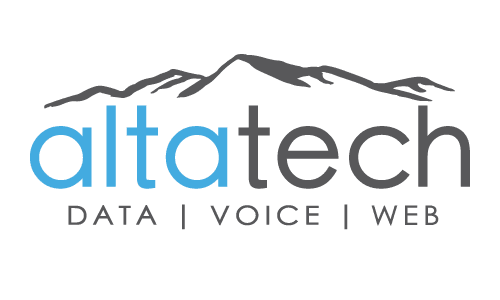Protect Your Business Data with Cloud Data Backup Solutions
Cloud data backup for business is essential in today’s digital landscape to protect critical data, ensure business continuity, and mitigate the risks associated with data loss or disasters. Altatech Solutions, as a Managed Service
Provider (MSP), can play a vital role in providing comprehensive cloud data backup solutions for businesses. Here’s why it’s needed and how Altatech Solutions MSP can assist.
Here’s why it’s needed and how Altatech Solutions can assist.
Data Protection
Business data, including customer information, financial records, and intellectual property, is invaluable. Cloud data backup safeguards against data loss due to hardware failure, human error, cyberattacks, or natural disasters.
Business Continuity
In the event of data loss or a system failure, having a backup in the cloud ensures that your business can continue operations without significant disruptions.
Cybersecurity Threats
Ransomware attacks and other cybersecurity threats can encrypt or destroy data. Cloud backup provides an extra layer of security by enabling data recovery from a separate, secure location.
Compliance Requirements
Many industries have regulatory requirements that mandate data retention and backup practices. Cloud data backup can help meet these compliance obligations.
Cost-Effective
Cloud backup eliminates the need for costly on-premises hardware and maintenance. It offers scalability and flexibility, allowing businesses to pay for the storage they use.
100% Satisfaction Guarantee
We want you to be completely satisfied with our services. We will do whatever it takes to make you happy. No hassles, no problems.
How Altatech Solutions MSP Can Help!
Protecting your business data is our top priority.
Assessment and Planning
Altatech Solutions can assess your business’s data backup needs, including data volume and recovery time objectives (RTOs), and develop a tailored backup strategy.
Selection of Cloud Backup Solutions
Altatech Solutions will help you choose the right cloud backup service or platform that aligns with your budget, security requirements, and scalability needs.
Implementation
Altatech Solutions will set up and configure the cloud backup solution, ensuring that data is regularly and securely backed up to the cloud.
Data Encryption
Altatech Solutions can implement strong encryption protocols to protect your data during transit and storage in the cloud, safeguarding it from unauthorized access.
Monitoring and Management
Altatech Solutions provides 24/7 monitoring and management of your cloud backup solution, ensuring that backups are successful and any issues are promptly addressed.
Regular Testing
Altatech Solutions conducts regular backup testing and recovery drills to verify that data can be restored efficiently when needed.
Disaster Recovery Planning
Altatech Solutions can assist in developing a comprehensive disaster recovery plan that incorporates cloud data backup as a key element, ensuring minimal downtime in case of disasters.
Compliance Support
Altatech Solutions helps you meet compliance requirements by configuring the backup solution to retain data for the necessary periods and ensure data integrity.
Don’t delay taking action on your disaster recovery plan until a disaster occurs.
By partnering with Altatech Solutions MSP for cloud data backup, your business can benefit from reliable, secure, and cost-effective data protection. Altatech Solutions’ expertise in cloud backup and disaster recovery ensures that
your critical data is safe and accessible, enabling your business to thrive in a secure digital environment. Choose Altatech Solutions for reliable and secure Cloud Data Backup solutions. We look forward to helping you safeguard
your valuable information.
f.a.q.
You have questions. wE have answers.
We acknowledge that you might have questions regarding IT Managed Service Provider, and we’re here to provide answers and assistance.
Managed IT services encompass a comprehensive range of solutions provided by specialized IT service providers to efficiently manage and support an organization’s technology infrastructure. Firstly, these services typically involve proactive monitoring and maintenance of IT systems. This entails constant oversight of networks, servers, workstations, and other technology components to identify and address issues before they escalate, minimizing downtime and disruptions.
Secondly, managed IT services offer robust technical support. Organizations can rely on expert IT professionals to troubleshoot and resolve hardware and software problems, assist with software updates, and provide user support, ensuring that technology-related challenges are promptly and effectively addressed. This on-demand assistance is invaluable for maintaining smooth operations.
Lastly, managed IT services often include cybersecurity measures. This involves implementing protective measures like firewalls, antivirus software, intrusion detection, and security patches to safeguard data and systems from cyber threats. Providers also assist with data backup and recovery solutions, ensuring that critical data is regularly backed up and can be swiftly restored in case of data loss incidents. In essence, managed IT services provide a holistic approach to managing an organization’s IT environment, enhancing security, reducing downtime, and allowing businesses to focus on their core operations.
Managed IT services refer to a comprehensive suite of outsourced IT solutions and support provided by specialized IT service providers, often known as Managed Service Providers (MSPs). These services are designed to assist businesses in efficiently managing and maintaining their IT infrastructure and technology needs. Managed IT services typically include proactive monitoring, technical support, cybersecurity, data management, and more.
Firstly, Managed IT services involve proactive monitoring and management of an organization’s IT systems. MSPs continuously oversee networks, servers, endpoints, and other IT components to detect and address potential issues before they disrupt operations. This proactive approach helps minimize downtime and ensures that IT systems operate smoothly and efficiently.
Secondly, Managed IT services offer technical support, allowing organizations to access expert assistance whenever they encounter IT-related challenges. MSPs assist in troubleshooting hardware and software issues, managing software updates, and providing user support. This responsive and knowledgeable support helps organizations resolve IT problems swiftly and effectively.
Lastly, Managed IT services prioritize cybersecurity. MSPs implement robust security measures, such as firewalls, antivirus software, intrusion detection, and security patches, to protect against cyber threats. They also often provide data backup and recovery solutions, ensuring that critical data is regularly backed up and can be quickly restored in case of data loss incidents. In essence, Managed IT services provide a holistic approach to IT management, enhancing security, reducing downtime, and allowing businesses to focus on their core objectives.
IT Support and IT Helpdesk are two related but distinct functions within an organization’s IT department, each serving a unique role.
Firstly, IT Support encompasses a broader scope of responsibilities. It involves not only addressing immediate technical issues but also proactive tasks such as maintaining and optimizing IT infrastructure, implementing software updates, and strategizing for long-term technology goals. IT Support professionals work behind the scenes to ensure the entire IT ecosystem runs smoothly. They often interact with various departments to align IT solutions with business objectives and provide guidance on technology-related decisions.
On the other hand, an IT Helpdesk primarily deals with immediate user interactions. Its focus is on providing responsive assistance to end-users who encounter IT-related problems or have specific questions. Helpdesk personnel handle inquiries, troubleshoot issues, and track user requests through ticketing systems. Their role is crucial in ensuring that employees or clients receive timely assistance, minimizing disruptions caused by technical problems. While IT Support takes a proactive approach, the IT Helpdesk operates reactively, providing immediate solutions to user-reported issues.
In summary, IT Support takes on a broader, more strategic role in managing an organization’s IT infrastructure, while the IT Helpdesk is primarily focused on delivering immediate user support and issue resolution. Both functions are essential for maintaining a smooth and efficient IT environment, with IT Support working to prevent problems and the IT Helpdesk being the frontline support for users facing technical challenges.
IT Support, short for Information Technology Support, is a vital service that involves providing assistance and solutions for various technology-related issues and challenges within an organization. Its primary purpose is to ensure the efficient functioning of an organization’s IT systems and infrastructure while addressing the needs of end-users.
Firstly, IT Support involves addressing technical problems that users encounter with hardware, software, networks, or other IT components. This includes troubleshooting issues such as computer crashes, software glitches, hardware failures, network connectivity problems, and more. IT Support professionals utilize their technical expertise to diagnose and resolve these issues promptly, minimizing disruptions to daily operations.
Secondly, IT Support plays a role in user assistance and education. IT Support personnel are responsible for helping end-users navigate and use technology effectively. They provide guidance, answer questions, and offer solutions to IT-related inquiries. This user-centric approach ensures that employees or clients can leverage technology to meet their work or personal needs while fostering digital literacy and proficiency.
In summary, IT Support is a crucial service that encompasses technical issue resolution and user assistance. It aims to maintain the functionality and reliability of an organization’s IT environment by diagnosing and addressing technical problems while empowering end-users to effectively utilize technology. This support function is essential for businesses to operate efficiently in our technology-driven world.
A Managed IT Provider plays a critical role in helping businesses effectively manage their technology infrastructure and IT needs. Firstly, they offer proactive monitoring and maintenance, ensuring that IT systems are running smoothly and identifying and addressing potential issues before they disrupt operations. This proactive approach minimizes downtime and keeps businesses running efficiently.
Secondly, Managed IT Providers offer technical support to address IT-related challenges and provide solutions. They assist with troubleshooting, software and hardware management, and user support, helping businesses navigate the complexities of modern technology.
Lastly, Managed IT Providers often take a strategic role, helping businesses align their IT strategies with their broader business goals. This includes advising on technology investments, implementing cybersecurity measures to protect against threats, and ensuring compliance with industry regulations. In essence, they serve as a trusted partner, allowing businesses to focus on their core activities while entrusting their IT needs to experts.


